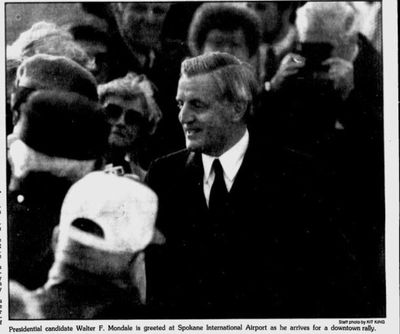This column reflects the opinion of the writer. Learn about the differences between a news story and an opinion column.
Spin Control: Walter Mondale was the last visitor of Spokane’s 1984 campaign season. Here’s who else used to stump in town

The passing of former Vice President Walter Mondale last week turned the final page on a time when Spokane seemed to be a must-stop on the presidential campaign trail. He was the last of the seven top-tier candidates or their surrogates to come through town before the 1984 election, and was the last surviving visitor from that busy campaign.
Washington’s 10 Electoral College votes seemed up for grabs. Western Washington had enough Republican votes and Eastern Washington enough Democratic votes that both presidential campaigns had a reason to draw a circle around the state.
Joan Mondale, the nation’s former second lady, made a stop at a Democratic fundraising dinner and sat for an interview with a Spokesman-Review reporter early in the year, although not so early that it wasn’t already clear her husband was the almost-certain nominee. The paper featured an artsy black-and-white profile of Joan Mondale, which generated some criticism from Democrats who found it less than flattering.
Shortly after the Democratic National Convention, at which Walter Mondale was nominated and became the first to pick the first female vice presidential nominee, Geraldine Ferraro popped into Spokane for a rally in the lobby of the prerenovation Davenport Hotel. It was early September but sweltering, and the lobby and mezzanine were packed beyond listed capacity. Someone in the crowd raised a sign that said “Dump Reagan. Jane Wyman did.” Ferraro read it and laughed.
On the sidewalks outside the hotel, a Democratic group from Montana sold posters of a remake of Delacroix’s “Liberty Leading the People” that substituted Ferraro for the Lady Liberty, and showed Mondale with an ERA sign attached to the bayonet of the musket. The national media snapped them up.
She stayed overnight at the Sheraton Hotel and, during an interview the next morning, noted the poster had her showing considerably less décolletage than the original.
Two days later, First Lady Nancy Reagan was in town to cut the ribbon on the opening of a new adolescent drug treatment facility at Deaconess Medical Center that was named for her. She talked with some young patients and made a nonpolitical speech about her concern for young victims of drug abuse.
In a later interview on her way back to the airport for a quick appearance at a fundraiser, she didn’t talk politics except when asked a question. To the suggestion that her visit was some sort of counter-programming to Ferraro’s, she looked genuinely surprised and asked when Ferraro had been in town. Her visit was strictly tied to the treatment center, she insisted.
Three weeks later, First Daughter Maureen Reagan came to Spokane in what was clear counter-programming to Ferraro and any suggestion that Democrats were superior to Republicans on women’s issues. She blamed the Equal Rights Amendment’s failure on Democrats, noting that, of the 15 states that hadn’t yet ratified the amendment, 13 were run by Democrats.
Vice President George Bush stopped in Spokane in mid-October for a rally – again at the Davenport. It was between presidential debates and he assured the gathered Republicans that Ronald Reagan, who seemed seriously off his game in the first debate, would do better in the second. Reagan is actually a good debater, Bush said in a later interview, adding that when they’d debated four years earlier, Reagan had won.
Reagan stopped in Seattle that year but didn’t make it to Spokane. He came in 1986 to campaign for Sen. Slade Gorton’s reelection with a rally at the old Coliseum.
Ferraro made several more trips to Washington before Election Day, with stops on the West Side.
Joan Mondale came back to Spokane twice in the fall, and Walter Mondale capped off the city’s season in the campaign spotlight with yet another Davenport rally just eight days before the election. He tried to convince a packed house the polls were turning around and he was going to pull off a come-from-behind victory.
What else could he tell them? Many folks in the hotel lobby probably had their doubts, and Ronald Reagan won Washington and 48 other states in a huge landslide the next week.
The weekend before the election, Spokane police estimated the cost of security for the various visits cost a total of about $40,000 in overtime.
But 1984 was the end of an era in Washington presidential politics. Republican candidates won the state for the fourth election in a row that year. They haven’t won it since.
Spokane has become a less frequent stop on the campaign trail with each succeeding campaign season. Candidates have been more likely to show up in the spring, looking for delegates when the state used the caucus system or vote margins now that it has gone to primaries.
By the fall, neither party’s candidate spends much time outside of a handful of “swing states.” If they come to Washington at all, it’s primarily to hit up the campaign ATM that Seattle has become.
